What is the Best Type of Robot Vacuum Filter?
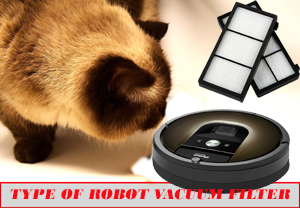
You will agree with me that, even when all your floors are clean, you may still remain with some bad odor. More so, if you keep pets, you understand that dander-related allergens are a real menace especially if you are allergic.
In this article, we are going to look at some of the filter technologies used by top robot vacuum cleaner brands but just before that, a little background information on the problem of allergy.
The problem of allergy
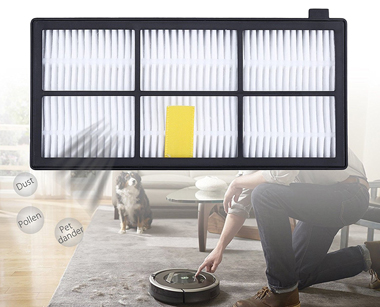
Pets and Allergies
We all love pets as they are great companions at home and that’s why you will find them in 62% of American households. Most of these pets are cats and dogs and as we know, they often shed hairs which have these allergens. Please note that pet hair is not an allergen as most people put it, they only harbor the allergens. These allergens include dander, skin flakes, saliva, urine, pollen, mold spores and so on. When these allergens come into contact with your nasal membranes, the body tries to fight back and that’s when you experience symptoms of allergy-like sneezing, running nose, facial pain, hives and so on.
The best way to prevent allergy is to ensure there are no allergens in the air and robot vacuum cleaners help a great deal in eradicating all these allergens from the air. They use filters that capture all the allergens leaving you with fresh, breathable air.
Filter technologies
All said and done, the elephant in the room remains, what’s the best filtration technology?
That will be our concern today. We will review some of the top filter technologies used by the popular robot brands and see how they stack up against each other. If you have an allergy and you keep pets, this is an article you will want to read to the end.
Primary vs. Secondary Filters
Filters can be categorized into 2 classifications; primary filters and secondary filters.
To ensure efficiency, manufacturers are now using double filters each designed to accomplish a specific task.
Typically, primary filters are for the large particles and dust and ensure that the dirt doesn’t go back to the floor. On the other hand, secondary filters are more detailed and are used to filter the smallest particles and allergens. In most vacuum cleaners for pets and allergies, you will find a dual filter system; one for solid dirt and the other one for filtering the air.
Unlike navigation and cleaning orientation, there is no much development with regards to filtration technology. Since the inception of HEPA filters, there has been no necessity for trying something better because of their efficiency. This will be our next subtopic
HEPA filters
If you have a nasal allergy, this is the best filter system that you should have. HEPA may be perceived as a filter and also as a standard. It is the abbreviation of high-efficiency particulate air or high-efficiency particulate arrester. If you look at most advanced vacuum cleaners and even air filters, this is the filter they use. HEPA is also a standard in that it is a classification of filter types depending on their performance. I’m sure you’ve heard of HEPA standard filters.
As a matter of fact, there are two classifications of HEPA filters categorized depending on their true standards. We have absolute HEPA filters and HEPA style filters.
True HEPA Filters vs. HEPA-Style Filters
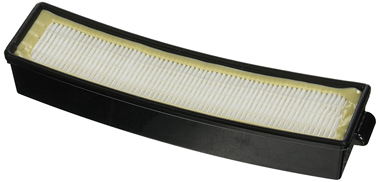
On the other hand, HEPA-style filters, as the name suggests duplicates the entire HEPA technology but still, these filters are not as effective as true HEPA filters because of one reason or another. They may capture 80% – 90% of allergens and are commonly used in most cheap filters. The ECOVACS DEEBOT N79 has a HEPA style filter.
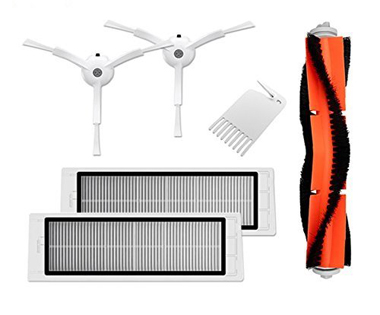
Interestingly, we now have washable HEPA filters. During summer when dust seems to clog everything, a clean wash with water will rejuvenate the efficiency of your filter. At times, just washing the filter might save you a few bucks.
You will realize that many top brands have HEPA filters, but this isn’t always the case. Popular robot vacuum cleaners like Roomba 650, Roomba 690, Botvac Connected D80 and several others lack HEPA filters.
MERV vs. HEPA
I know these two terms are very confusing and you are probably thinking what is what. I would say that they are both filter ratings, but their difference is their approach.
MERV stands for Minimum Efficiency Reporting Value and the grading is based on the size of the particles a filter can comfortably handle. The ratings are from 1-16 and the higher the rating, the better the performance.
That said, you will realize that in as much as they are two different things, they mean the same thing. It is just the same thing but in a different language. Typically, a HEPA filter will have a MERVE rating of 16 and above.
Allergen filters – do they work?
This has been a common term especially with the growing need for allergens vacuuming. Now, you will find filters advertised as allergen filters meaning they have been designed to catch pet hair, dander, skin flakes and clear the bad odor of urine and poop.
However, I find no much truth in this because there are no definite technologies that the manufacturers would back their filters with.
Scented filters
These are filters that are scented to at least alleviate bad odor.
They come in a variety of scents depending on your taste.
What’s the best filter system?
Tips to prevent bad odor
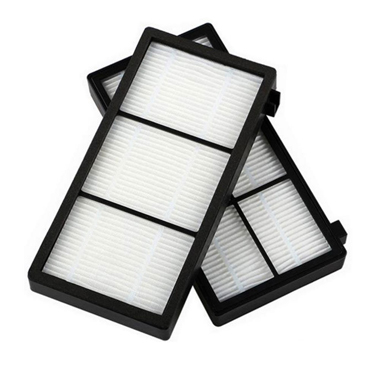
Empty the bin regularly
In as much as you have a large bin, always empty it after every cleaning session. The buildup of pet hair, dander, skin flakes and other dirt leads to a foul smell. This is further worsened by moisture and the warmth of the bin. Even though it can be tedious to empty the bin after every clean, it is among the surest ways of ensuring there’s no bad odor in your house.
Clean the robot vacuum entirely
Remember, the dirt that causes bad odor doesn’t hide only in the bin, it may also hide in other parts of the unit. Find time and clean the entire robot. A good cleaning agent would be baking soda. Use a clean damp cloth and avoid using a lot of water
Clean your filters regularly
It gets to a time when your filters get clogged because of excess dirt. But when removing the filters, remember assembling it back may be quite hard so you need to be very keen on the parts. If they are washable, the better. Use clean water and allow them to dry completely.
Ventilation is key
One of the important things homeowners forget is ventilating their house well. In as much as there are vents, opening the windows when the vacuum cleaner is working may be helpful. Remember, these filters won’t be 100% effective so having some fresh air coming in will at least help drive out bad odor.
Frequently Asked Questions
Do Roomba robot vacuum cleaners use HEPA filters?
Can I wash a filter in my Roborock S6 robot vacuum?
Do robot vacuum cleaners help eliminate allergens from the air?
How often should I change a filter in my robot vacuum cleaner?
Wrapping Up
The kind of filter you have greatly determines the quality of air you will get.
So, until next time, bye and don’t forget to subscribe to our blog for the latest robot vacuum deals and discounts!


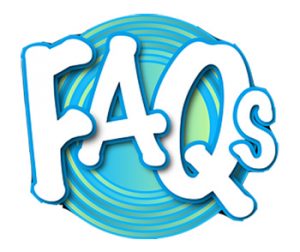

Jude
Do you know if the new iRobot i7 (not the + version) comes with a HEPA filter?